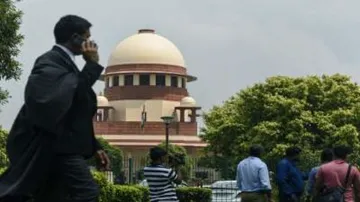Electoral bonds a process to turn black money into white, violates right to information, says SC | Key points
In November 2023, a 5-judge Constitution Bench headed by CJI Chandrachud and comprising Justices Sanjiv Khanna, BR Gavai, JB Pardiwala, and Manoj Misra had reserved its verdict on pleas challenging the validity of the electoral bonds scheme after hearing the arguments for three days in a row.

A five-judge Constitution bench of the Supreme Court on Thursday struck down electoral bonds scheme as 'unconstitutional' saying it violates Right to Information under Article 19(1)(a). The top court delivered its judgement in the case concerning the legal validity of the electoral bonds scheme that allows anonymous donations to political parties.
- The Supreme Court said that the electoral bonds scheme is not transparent, adding it has become a process to turn black money into white.
- The top court has asked State Bank of India to stop issuing electoral bonds with immediate affect.
- Pronouncing the judgement, CJI DY Chandrachud said that there are two separate but unanimous verdicts. One verdict is penned by him and the other by Justice Sanjiv Khanna and both the verdicts are unanimous.
- Supreme Court says political parties are relevant units in the electoral process and information about funding of political parties is essential for electoral choices.
- It holds that anonymous Electoral Bonds scheme is violative of Right to Information under Article 19(1)(a).
- The court said infringement to the Right to Information is not justified for the purpose of curbing black money. Whether right to information under 19(1) includes right to know about political funding.
- This court recognised right to information about social,cultural, political and economical issues... and that it is not limited to state affairs but to further participatory democracy principle.
- Political parties are relevant political unit in the political process. Information about political funding is essential to exercise correct choice of voting.
- Economic inequality leads to differing level of political engagements. Access to information leads to influencing the policy making and also leading to 'quid pro quo' arrangements may also help a party by the party in power.
- We are of the opinion that least restrictive means test is not satisfied... there are other means other than electoral bonds to achieve that purpose.
- Contribution by other means of electronic transfer and electoral trusts is other restrictive means, thus curbing black money is not a ground for electoral bonds.
- Fundamental right to privacy includes a citizen's right to political privacy and political affiliation. Information about a citizens political affiliation can lead to subjecting a citizen to curbs or subjecting them to trolls.
- It can be used to disenfranchise voters through voter surveillance.
- Book purchase history shows the ideological leanings, etc can lead to gauging political affiliations. Financial contribution to political parties are generally for support to party or for quid pro quo... law as of now allows it by corporations and individuals... when the law permits political contributions showing political support it is duty of constitution to protect them.
- Some contribution is also for not major parties and it is generally to show support.
- Constitution does not turn a blind eye only because there is a possibility of misuse. We have use the double proportionality standard. Clause 7(4) of B scheme tilts the balance is favour of informational privacy because it grants anonymity to the contributors but there is no nexus to balancing measures adopted... the information about electoral bonds contributions is exempted from disclosure requirements... transparency in political funding cannot be achieved by absolute exemption.
- It is quite possible that contribution beyond 20,000 could also be support and not for quid pro quo... Union of India has been unable to establish that 7(4) is the least restrictive means to curb right to information.
- Amendment to section 29(1)(c) of RPA and IT act amendment is declared to be unconstitutional.
- The only purpose of amending section 182(3) of the companies act becomes otiose after we hold that EB scheme, IT act making non disclosures acceptable and RP Amendment as unconstitutional. #electoralbonds #supremecourt
Electoral bonds scheme transparent, Centre's affidavit
The Central government in its counter-affidavit maintained that the electoral bonds scheme is transparent.
The verdict has come after various petitions were filed before the top court challenging at least five amendments made to different statutes through the Finance Act, 2017 on the ground that they have opened doors to unlimited, unchecked funding of political parties.
The petitions also raised the ground that the Finance Act could not have been passed as a money bill.
ALSO READ | Electoral bonds scheme is unconstitutional, rules Supreme Court in its big verdict ahead of Lok Sabha polls